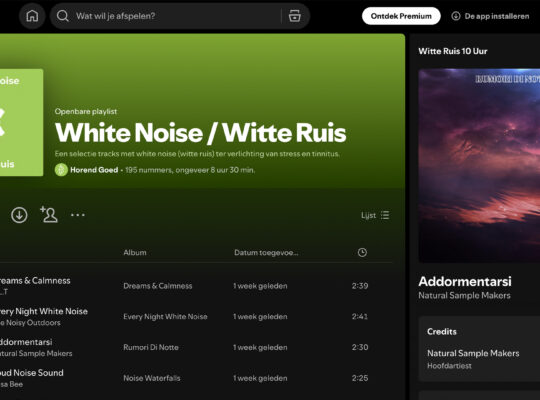Sometimes when we think of loud noises we immediately think of concerts, airplanes or construction sites. Logical, because those are the classics. But did you know that everyday sounds in the home or on the street can also put a strain on your hearing? And often so subtle that you don’t even notice it?
Hearing damage is not only caused by extreme peaks. Repeated exposure to slightly too loud sounds – day in, day out – can also affect your hearing unnoticed. Time for a reality check: which sounds in your daily life are actually suspiciously loud?
Here they come: 10 everyday sounds you may not have known can be quite dangerous to your ears.
1. The hair dryer
A hair dryer is one of those devices that you unconsciously hold quite close to your ears. And these things blow not only warm air, but also an average of 85 to 95 decibels of sound in your direction. Especially if you use it daily, that can pose a risk – especially if your hearing is already sensitive.
Tip: Blow-dry your hair at arm’s length and no longer than necessary. Or let it dry naturally if you can.
2. The blender or food processor
A smoothie sounds healthy, but your ears sometimes think otherwise. Blenders and food processors can easily top 90 to 100 decibels – especially if they are older or vibrate on hard surfaces.
Tip: Use them as briefly as possible and stay at a safe distance. Or dampen the sound by placing a silicone mat under the device.
3. Hand dryers on public restrooms
That super-fast, powerful jet that dries your hands in five seconds? That one often produces between 95 and 100 decibels. In a small room with lots of reverberation – like a toilet – it seems even louder.
Tip: Keep some distance or just dry your hands the old-fashioned way on a paper towel.
4. Vacuum cleaners
A vacuum cleaner is also one of those loud everyday sounds where you don’t immediately stop and think. It produces an average of 70 to 85 decibels. Not directly hearing-destroying, but prolonged use without breaks – think of a major cleaning – can make your ears pretty tired. And some models go a lot louder.
Tip: Wear ear muffs if you vacuum for long periods of time (especially when combined with other loud appliances) or invest in a quieter model.
5. Music through earbuds
We all know it, but we do it anyway: playing music just a little too loud, especially in noisy environments such as on the train or while exercising.
What you need to know: earplugs are closer to your eardrum than headphones, which increases the risk of hearing damage. And if you can barely hear your surroundings anymore, it’s really too loud.
Tip: Use earplugs with volume limiting or noise canceling so you can turn down the volume and still hear everything clearly.
6. The coffee maker
Yes, really. Especially fully automatic espresso machines with bean grinders can be quite noisy: 85 to even 95 decibels, depending on the model. If you brew several cups a day, your hearing will be put to considerable work unnoticed.
Tip: Use a device with a quieter motor or move it a little farther away from you.
7. Children screaming or shrieking
We love them, but when they go wild in a small space, their voices can peak above 100 decibels – especially in an echoing space such as a bathroom, living room or car.
Tip: Try to absorb sound with soft materials (rugs, curtains), and give your ears a rest every now and then if you live in a busy household.
8. Traffic – especially scooters and motorcycles
You don’t have to live next to a highway to be bothered by traffic. One crackling scooter driving by, or a motorcycle with an open exhaust, produces as much as 95 to 110 decibels. And that can cause damage after only a few seconds.
Tip: Do you live along a busy road? Consider soundproof windows or hearing protection when biking or walking past traffic.
9. Alarm clocks and alarms
Of course they should wake you up or warn you, but some alarm clocks and cooking alarms literally scream you awake. Especially for the hearing impaired, there are models that beep extra loud – sometimes above 100 decibels.
Tip: Choose an alarm clock with vibrate function or light flash. Better for your ears AND less stressful waking up.
10. The microwave or washing machine beep
You know it: a high-pitched, piercing beep when the microwave is done. Or those cheerful tunes from your washing machine at the end of a program. Irritating, but also… surprisingly loud. Especially if they’re directly in your kitchen or living room.
Tip: Turn down notification beeps if you can. Or choose devices with a more subtle signal.
Daily noises: what exactly is “too loud”?
In general, sounds above 80 decibels can cause hearing damage with prolonged exposure. And the louder the sound, the shorter the time in which damage occurs. A sound of 100 decibels, for example, can cause risk within as little as 15 minutes.
And no, you don’t feel it right away. You only notice it over time: a slight squeak, difficulty conversing in crowded rooms, fatigue after a noisy day…. Those are the first signs.
What can you do to protect your ears when exposed to everyday sounds?
- Use hearing protection. Especially at jobs, music, concerts or festivals. Good earplugs come in all kinds, from discreet to custom-made.
- Give your ears a rest. Like your body, your ears need recovery. After a busy day, consciously put on silence.
- Have your hearing tested regularly. Especially if you work in noise or often experience loud noises.
- Use smart alternatives. Such as a vibrating alarm clock, a Bebird for safe ear cleaning, or ear muffs while vacuuming.
Be aware of the danger of everyday sounds
You really don’t have to live in complete silence. But being aware of which everyday sounds are (too) loud can make a world of difference. Because hearing loss often comes slowly, almost stealthily. And once it’s there, it’s often permanent.
So be kind to your ears. They do their best every day to let you hear the world. The least you can do? Turn things down a little.








